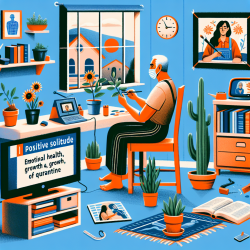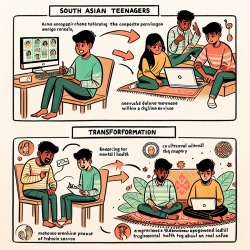Introduction
The COVID-19 pandemic has imposed unprecedented social restrictions worldwide, leading to significant psychological distress. As these restrictions are lifted, the transition back to routine poses new challenges. The research article, “Post-lockdown Depression”: Adaptation Difficulties, Depressive Symptoms, and the Role of Positive Solitude When Returning to Routine After the Lifting of Nation-Wide COVID-19 Social Restrictions, provides valuable insights into these challenges. This blog explores how practitioners can leverage these findings to improve therapeutic outcomes for their clients.
Understanding Post-Lockdown Depression
The study conducted in Israel, one of the first countries to lift COVID-19 restrictions following a successful vaccination campaign, highlighted that 40.4% of participants experienced mild depressive symptoms post-lockdown. Adaptation difficulties were closely linked to these symptoms, particularly among individuals with low levels of positive solitude.
The Role of Positive Solitude
Positive solitude, defined as the voluntary choice to engage in meaningful activities alone, emerged as a crucial moderator. Individuals with high positive solitude experienced fewer depressive symptoms despite adaptation challenges. This suggests that fostering positive solitude can be a powerful tool in supporting mental health during transitions.
Implications for Practitioners
For practitioners, integrating the concept of positive solitude into therapy can enhance client resilience. Here are some strategies to consider:
- Encourage Self-Reflection: Facilitate sessions that promote introspection and personal growth, helping clients find joy and meaning in solitary activities.
- Develop Coping Strategies: Work with clients to identify activities that provide a sense of fulfillment and peace when done alone.
- Promote Emotional Regulation: Teach techniques that help clients manage emotions independently, fostering a sense of control and stability.
Further Research and Application
While the study provides a foundational understanding, further research is needed to explore positive solitude across different demographics and cultural contexts. Practitioners are encouraged to contribute to this growing body of knowledge by documenting and sharing their experiences and outcomes.
Conclusion
The transition from lockdown to routine is fraught with psychological challenges, but positive solitude offers a promising avenue for mitigating depressive symptoms. By integrating these insights into practice, therapists can better support their clients in navigating post-lockdown life.
To read the original research paper, please follow this link: “Post-lockdown Depression”: Adaptation Difficulties, Depressive Symptoms, and the Role of Positive Solitude When Returning to Routine After the Lifting of Nation-Wide COVID-19 Social Restrictions.










